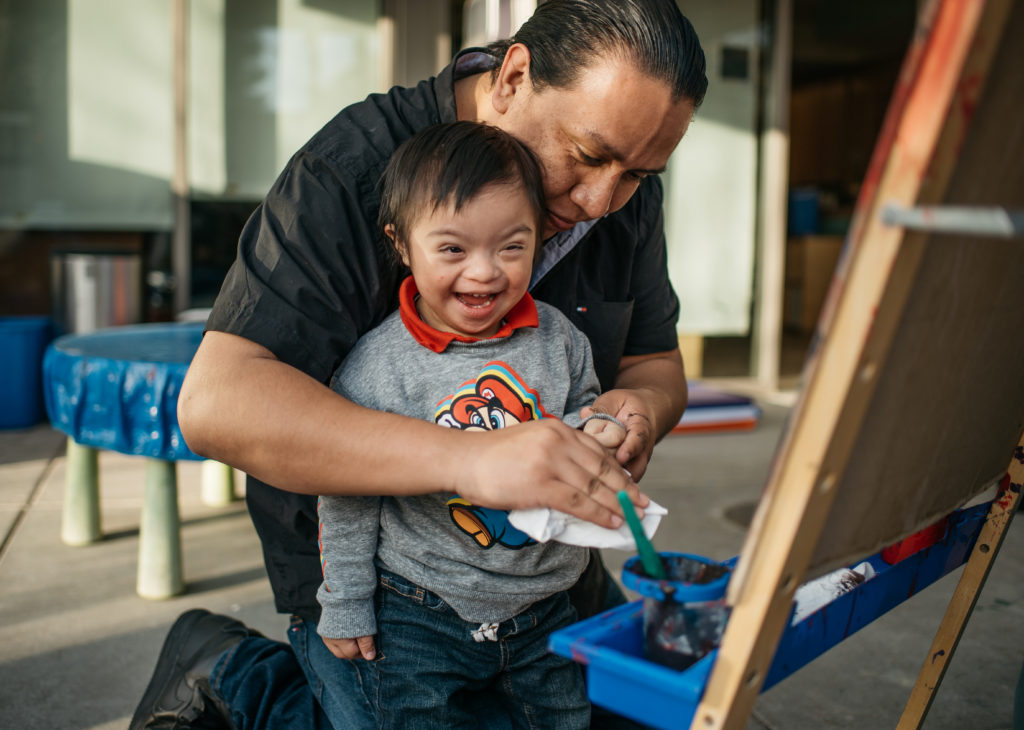Our Approach at TLG
Since its founding in 1982 TLG has emphasized building on child and family strengths and enhancing potential. We focus on preventing unnecessary child delays and parent/child difficulties that may impact development by addressing them promptly with very early, flexible, and practical services tailored to a diversity of issues and cultures.
TLG’s intervention model has always blended infant, child/parent, and family therapy with developmental intervention, practical disability resources, and adaptations—such as babycare equipment. TLG provides mostly home-based services to families when a child or parent has a disability, medical, or developmental issue. This includes babies, children, youths, expectant parents, parents, parenting grandparents, and other caretakers. These services support parent/child and family relationships and nurture the potential of all members of the family. Families can connect with one another through our parenting/support groups, parent networking, and our Early Head Start’s socializations.
TLG’s Early Head Start provides inclusive center and home-based services to families with and without disabilities. TLG and its EHS are part of the Ed Roberts Campus, a unique “one-stop shop” multi-agency environment for individuals and families with disabilities.
TLG’s staff includes psychologists, occupational therapists, marriage and family therapists, social workers, rehabilitation counselors, developmental specialists, and early childhood educators. Approximately 70% of the 47 staff have personal or family disability experience and almost 50% are people of color—and our staff are fluent in many languages. In addition, TLG has an ongoing training program for 10-15 psychology doctoral students who contribute to the diverse perspectives of its services.
TLG provides ongoing services to approximately 350 families with disabilities annually. These families are mostly low-income and 90% of color, with many languages and cultures. Annually, approximately 1500 additional clients receive mental health/developmental consultation in other early childhood centers, or participate in TLG’s parenting groups, or group for mentoring young adults with disabilities.
TLG’s approach has always included efforts to improve national and international practice with families with disabilities. This has included developing new resources, conducting research and training, providing technical assistance and information dissemination, and supporting public policy change.

Our Vision
The vision of Through the Looking Glass is conveyed by the connotation of our name. Disability experience does not have to be just negative or traumatic. Like Alice’s Through the Looking Glass experience, disability brings new perspectives that can engender creativity and new meanings, including playfulness and humor! The reflection of the looking glass points to the profound role people with personal or family disability experience can play for one another.
The mission of TLG emphasizes services which are “guided by personal disability experience and disability culture,” reflecting the wisdom, expertise, and new meanings that can emerge from disability experience.
TLG’s vision is built on a disability culture perspective. This understanding of disability focuses on socio-cultural factors as primary obstacles for people with disabilities. TLG emerged from the disability civil rights movement (independent living movement) and has a social change orientation that emphasizes addressing and reducing disability obstacles on all levels: in parent/child relationships and care, family systems/households, communities, services, professional training, research, and public policy.
TLG recognizes the intersection of disability, poverty, and racism experienced by its clientele, and is committed to ongoing efforts to address bias and equity in its organization as well as in the community. It adheres to the “Diversity-informed tenets for work with infants, children, and families” (visit the Diversity Informed Tenets website).
At TLG we emphasize a family life-cycle perspective, gained from conducting research and serving parenting families with disabilities during many stages of their lives, including during pregnancy, throughout childhood, and through the transition to adulthood. We serve families when babies or children have disabilities, as well as when parents or parenting grandparents have disabilities. In addition, many TLG staff have varied personal and family disability experience and varied cultural experience. TLG is a celebration of diverse perspectives and a demonstration that these perspectives can be bridged and that bridging them can produce particularly effective, empathetic, and respectful family intervention as well as innovative approaches to research and training.